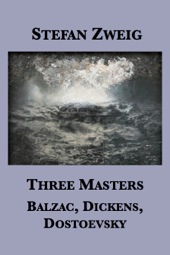 $9.99 on Kindle
$9.99 on Kindle(cover: Susan Erony, Ocean Eyes, mixed media on canvas, 9" x 12", 2010)
Three Masters: Balzac, Dickens, Dostoevsky by Stefan Zweig (translated from the German by Eden and Cedar Paul, with a chronology of Stefan Zweig's life and a bibliography of works by and about Stefan Zweig in English by Randolph Klawiter; 77,000 words)
In these early 20th century literary essays, Stefan Zweig offers a Central European view of the writers he believed to be the “three greatest novelists” of the 19th century: Balzac, Dickens, and Dostoevsky.
In Zweig’s view, Balzac set out to emulate his childhood hero Napoleon. Writing 20 hours a day, Balzac’s literary ambition was “tantamount to monomania in its persistence, its intensity, and its concentration.” His characters, each similarly driven by one desperate urge, were more vital to Balzac than people in his daily life.
In Zweig’s reading, Dickens embodied Victorian England and its “bourgeois smugness”. His characters aspire to “A few hundred pounds a year, an amiable wife, a dozen children, a well-appointed table and succulent meats to entertain their friends with, a cottage not too far from London, the windows giving a view over the green countryside, a pretty little garden, and a modicum of happiness.” The ideal of middle-class respectability suffuses Dickens’ fiction.
Dostoevsky drew on the struggles of his own life to illuminate the contradictions of the human soul. In Zweig’s view, his heroes had no desire to be citizens or ordinary human beings. While Balzac’s heroes “would gladly have subjugated the world, Dostoevsky’s heroes wished to transcend it.”



